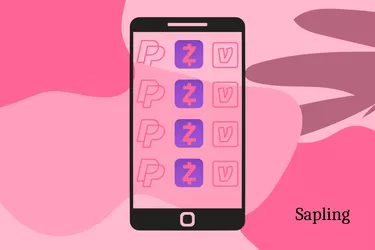
PayPal and Venmo are online payment platforms. They allow you to transfer funds to individuals. These are called peer-to-peer apps. For example, you can send money to your sister, who may need a loan, or you can pay for a pizza. You can also receive funds for services or products you've sold.
They're considered third-party network transactions by the IRS. So what does the IRS say about these transactions? Are they taxed?
Video of the Day
Video of the Day
Business Transactions Taxed
Business transactions on third-party networks or payment apps have always been taxed. But you may notice it more this year. That's because the Internal Revenue Service (IRS) has adjusted the income amount requiring a 1099-K Form. This is a tax form you receive from a third-party network, like a payment app, that documents payments for goods and services.
Prior to 2022, the minimum yearly income for a business on a payment app that needed to be reported was $20,000 and more than 200 transactions. If this occurred, the payment app issued a 1099-K.
Business transactions on third-party networks or payment apps have always been taxed.
But that amount has changed. The new amount that triggers a 1099-K Form is $600 and any number of transactions. The IRS wanted to improve "voluntary tax compliance." So, they changed the minimum threshold.
What that means is if you conduct business and earn above that minimum of $600, the payment app is obliged to report it to the IRS. The payment app will then send you the 1099-K Form so you can use it to file your income taxes.
Personal Transactions Are Different
The minimum $600 change doesn't affect personal transactions. So if you're reimbursing your friend for gas money spent on that big trip you took, you won't receive a 1099-K for that. But be careful what you put in the memo of the payment. If you jokingly write "services rendered" when you re-pay your friend, it might look like you're paying them for a business matter.
PayPal Provides Forms
PayPal requires your tax information when you set up an account. This could be a Social Security number, Individual Taxpayer Identification Number (ITIN) or Employer Identification Number (EIN). PayPal is strict about obtaining this information. They will withhold funds until they have all your information.
The 1099-K Form is available on their platform. Go into your account and then go to the PayPal Statements and Tax Center if you are an individual. Merchants can access their forms by going to the Tax Statement Page.
Once accessed, you only need to download and print it when it's time to do your taxes.
Venmo Used in the U.S.
Venmo, a payment app only used in the U.S., requires that tax information be provided by December 31, although they encourage users to send information to them sooner.
You must provide Venmo with a Social Security number, Individual Taxpayer Identification Number (ITIN) or Employer Identification Number (EIN). If you don't give them this information by the end of the year, a hold will be placed on your Venmo products or services payments. They will still report to the IRS if you don't provide the information.
Stripe Integrates Payment for Merchants
Although PayPal and Venmo cater to personal and business, Stripe primarily processes payments for merchants. As a result, it works for both online and brick-and-mortar retailers.
Because Stripe is primarily for merchants, the platform allows a merchant to sign up for the tax category that best describes their services. Then, Stripe adds the appropriate sales taxes, enabling you to collect the correct amount. Stripe is not a peer-to-peer app; it is a banking-as-a-service application programming interface (API). But those users on the platform still must receive a 1099-K Form.
Zelle Excluded From 1099-K
The Zelle network is excluded from the IRS rules governing third-party networks. Only peer-to-peer apps are required to provide 1099-K forms. And Zelle is not a peer-to-peer app.
Zelle is connected to participating banks or credit unions. It is a communication between these financial institutions. To use Zelle, you must be a bank customer or credit union member. In other words, you must have a bank account at a participating financial institution.
- Stripe: 1099-K Forms Issued by Stripe
- IRS: About Form 1099-K, Payment card and third Network Transactions
- IRS: Understanding Your form 1099-K
- Venmo: 2022 Tax FAQ
- Forbes: What is Venmo and How Does it Work
- PayPal: Your PayPal Journey Starts Here
- PayPal: How Can We Help
- Stripe: Available Tax Categories
- Stripe: Embed financial Services in Your Platform
- Forbes: What is Zelle and How Does it Work